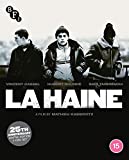 La Haine (2-Disc Blu-ray) | Blu Ray | (21/11/2022)
from £15.98
| Saving you £N/A (N/A%)
| RRP
La Haine (2-Disc Blu-ray) | Blu Ray | (21/11/2022)
from £15.98
| Saving you £N/A (N/A%)
| RRP Turning the camera away from iconic Paris to the concrete banlieue, Mathieu Kassovitz's second feature as a director changed the cultural landscape of French cinema when it landed at the Cannes Film Festival in 1995, winning the Best Director prize. The film takes place over 24 hours following the police shooting of a young man from a deprived housing estate, and shows the world through the eyes of three friends - one North African, one Jewish and one black - who are frustrated with politicians, the media and police brutality. Black-and-white visuals, a thumping hip-hop soundtrack and graffiti-daubed streets underscore the urgency and rebellion at the heart of this game-changing classic. Product Features Director approved 4K restoration Audio commentary by Mathieu Kassovitz (2004) Redefining Rebellion (2020, 5 mins): film critic Kaleem Aftab explores the spirit of revolution in La Haine Screen Epiphany: Riz Ahmed introduces La Haine (2020, 14 mins): the award-winning actor talks about his connection to the film Interview with Mathieu Kassovitz (2020, 35 mins): interview with the actor, writer and director Three short films by Mathieu Kassovitz: Fierrot le pou (1990, 7 mins), Cauchemar Blanc (1991, 10 mins), Assassins (1992, 12 mins) 10 Years of La Haine (2005, 84 mins): feature-length documentary marking the 10th anniversary of Matthieu Kassovitz's award-winning film Casting and rehearsals (1995, 19 mins) Anatomy of a Scene (1995, 7 mins): a look at the shooting of a particularly challenging scene Behind the Scenes (1995, 6 mins): Kassovitz, his cast and crew prepare to embark on making La Haine Colour deleted and extended scenes (1995, 17 mins): including afterwords by Mathieu Kassovitz on selected scenes Trailers
 The Constant Gardener/Out Of Africa | DVD | (26/12/2006)
from £3.97
| Saving you £9.02 (227.20%)
| RRP
The Constant Gardener/Out Of Africa | DVD | (26/12/2006)
from £3.97
| Saving you £9.02 (227.20%)
| RRP Constant Gardener (Dir. Fernando Meirelles 2005): In a remote area of Northern Kenya activist Tessa Quayle (Rachel Weisz) is found brutally murdered. Tessa's companion a doctor appears to have fled the scene and the evidence points to a crime of passion. Members of the British High Commission in Nairobi assume that Tessa's widower their mild-mannered and unambitious colleague Justin Quayle (Ralph Fiennes) will leave the matter to them. They could not be more wrong.... Haunted by remorse and jarred by rumors of his late wife's infidelities Quayle surprises everyone by embarking on a personal odyssey that will take him across three continents. Using his privileged access to diplomatic secrets he will risk his own life stopping at nothing to uncover and expose the truth; a conspiracy more far-reaching and deadly than Quayle could ever have imagined. Based on the novel by John Le Carre The Constant Gardener was nominated for 3 Oscars and Rachel Weisz duly collected statuette hers for a superb supporting turn as Tessa Quayle. Out of Africa (Dir. Sydney Pollack 1985): Sydney Pollack directs this sweeping romantic drama based on the memoirs of Danish writer Isak Dinesen. Meryl Streep stars as Karen Blixen the restless wife of European aristocrat and plantation owner Baron Bror Blixen (Brandauer). When Bror departs to hunt big game and chase women the running of their East African coffee plantation falls to Karen. She throws herself into this task with the same determination and spirit she brings to her passionate but sporadic affair with free-spirited British hunter Denys Finch Hatton (Robert Redford). While enduring her husband's infidelities and the eventual destruction of their beloved land she entertains Denys and befriends the workers. Hatton shares Karen's profound love for the African landscape but is unwilling to sacrifice his independence for their relationship...
 La Haine (2-disc Blu-ray, 25th Anniversary Edition) | Blu Ray | (23/11/2020)
from £22.79
| Saving you £N/A (N/A%)
| RRP
La Haine (2-disc Blu-ray, 25th Anniversary Edition) | Blu Ray | (23/11/2020)
from £22.79
| Saving you £N/A (N/A%)
| RRP Simmering hostility and prejudices boil over in Mathieu Kassovitz's provocative and compelling portrait of a Parisian housing project. Set in the aftermath of a riot, three friends Vinz (Vincent Cassell), Hubert (Hubert Koundè) and Saïd (Saïd Taghmaoui) trapped by their economic, ethnic and community circumstances, navigate the escalating urban discontent. But, with tensions still high and the threat of violence everpresent, the trio drift towards an increasingly dangerous destiny. Newly restored in 4K, La Haine's scalding take on France's social divide still carries a knockout punch. Beautifully shot in black and white by Pierre Aïm, this mid1990s landmark remains as fresh and relevant 25 years on from its original release.
 The Constant Gardener/Out Of Africa/Catch A Fire | DVD | (22/09/2008)
from £11.48
| Saving you £8.51 (42.60%)
| RRP
The Constant Gardener/Out Of Africa/Catch A Fire | DVD | (22/09/2008)
from £11.48
| Saving you £8.51 (42.60%)
| RRP Titles Comprise: The Constant Gardener: In a remote area of Northern Kenya activist Tessa Quayle (Rachel Weisz) is found brutally murdered. Tessa's companion a doctor appears to have fled the scene and the evidence points to a crime of passion. Members of the British High Commission in Nairobi assume that Tessa's widower their mild-mannered and unambitious colleague Justin Quayle (Ralph Fiennes) will leave the matter to them. They could not be more wrong.... Haunted by remorse and jarred by rumors of his late wife's infidelities Quayle surprises everyone by embarking on a personal odyssey that will take him across three continents. Using his privileged access to diplomatic secrets he will risk his own life stopping at nothing to uncover and expose the truth; a conspiracy more far-reaching and deadly than Quayle could ever have imagined. Based on the novel by John Le Carre The Constant Gardener was nominated for 3 Oscars and Rachel Weisz duly collected statuette hers for a superb supporting turn as Tessa Quayle. Out Of Africa: Meryl Streep stars as Karen Blixen the restless wife of European aristocrat and plantation owner Baron Bror Blixen (Brandauer). When Bror departs to hunt big game and chase women the running of their East African coffee plantation falls to Karen. She throws herself into this task with the same determination and spirit she brings to her passionate but sporadic affair with free-spirited British hunter Denys Finch Hatton (Robert Redford). While enduring her husband's infidelities and the eventual destruction of their beloved land she entertains Denys and befriends the workers. Hatton shares Karen's profound love for the African landscape but is unwilling to sacrifice his independence for their relationship... Catch A Fire: A political thriller that powerfully tells the real-life story of a South African hero's journey to freedom. In the country's turbulent and divided times in the 1980s Patrick Chamusso (Derek Luke) is an oil refinery foreman and soccer coach who is apolitical - until he and his wife Precious (Bonnie Henna) are jailed. Patrick is stunned into action against the country's oppressive reigning system even as police Colonel Nic Vos (Tim Robbins) further insinuates himself into the Chamussos' lives.
![La Haine [Blu-ray] [1995]](/pictures/1094859.jpg) La Haine | Blu Ray | (17/08/2009)
from £38.98
| Saving you £-22.99 (N/A%)
| RRP
La Haine | Blu Ray | (17/08/2009)
from £38.98
| Saving you £-22.99 (N/A%)
| RRP Inspired by cinematic classics including Mean Streets Do the Right Thing and The Battle of Algiers Mathieu Kassovitz's LA HAINE is arguably the most incendiary provocative and prescient fi lm to emerge from the '90s. Starkly shot in black and white to show a Paris not on any tourist map the fi lm deals with France's intolerance towards outsiders following Vinz (Vincent Cassel Irreversible Ocean's 12) Hubert (the magnifi cent Hubert Kound'') and Sa''d (Sa''d Taghmaoui Hideous Kinky Three Kings) three young men trapped in the Parisian economic ethnic and social underclass. Sensationally premiered at the 1995 Cannes Film Festival LA HAINE saw Kassovitz rewarded with the Best Director prize and subsequently went on to win three C''sars (including Best Film). Marked by its unapologetic brutality and v''rit'' style LA HAINE acted as a compelling wake up call to Europe.
![La Haine - Ultimate Edition (Limited Edition Steel Tin packaging) [1995]](/pictures/1039643.jpg) La Haine - Ultimate Edition (Limited Edition Steel Tin packaging) | DVD | (05/06/2006)
from £N/A
| Saving you £N/A (N/A%)
| RRP
La Haine - Ultimate Edition (Limited Edition Steel Tin packaging) | DVD | (05/06/2006)
from £N/A
| Saving you £N/A (N/A%)
| RRP Three Young Friends... One Last Chance. Police viciously beat a 16-year-old housing estate kid they are questioning leaving him almost dead. Responding to violence teenagers from the estate turn their home into a 24 hour war zone. Among the people blinded by hate are Said Vinz and Hubert youths who survive on petty crime and dealing dope. In the intensely volatile environment the teenagers find a chrome-plated Smith & Wesson 44 that a plain-clothes cop has lost. If killin
![Comment J'ai Tue Mon Pere [2001]](/pictures/1005788.jpg) Comment J'ai Tue Mon Pere | DVD | (21/04/2003)
from £8.95
| Saving you £11.04 (123.35%)
| RRP
Comment J'ai Tue Mon Pere | DVD | (21/04/2003)
from £8.95
| Saving you £11.04 (123.35%)
| RRP Cool, subtle psychological drama is a French speciality, and Anne Fontaine's Comment J'ai Tue Mon Pere ("How I Killed My Father") is an ultra-classy specimen of the genre. A study in the way emotional paralysis gets passed on from one generation to the next, it often recalls Philip Larkin's famous lines, "They fuck you up, your mum and dad; they may not mean to, but they do." Jean-Luc, a wealthy gerontologist to the ageing rich of Versailles (that's the town, rather than the ex-royal palace) gets a letter from Africa telling him his father's dead. Since his parent walked out on him and his brother when they were little, he's not too shattered by the news. But next thing he knows, the old boy has shown up and invited himself in for an indefinite stay. And under his blandly disruptive gaze, all the hidden faultlines in Jean-Luc's life--in his marriage, his relationships with his mistress and his failed-actor younger brother--start cracking wide open. Fontaine's film has points in common with Nanni Moretti's masterly The Son's Room, which also showed a professional man's seemingly flawless life crumbling under unforeseen family stresses. But befitting its Italian setting, that was a far warmer and less inhibited set-up. As Jean-Luc, Charles Berling's ice-blue eyes and chiselled good looks seem frozen in a mask of tight repression, and he's superbly matched by veteran actor Michel Bouquet as Maurice, his manipulative father. Both actors, and Stéphane Guillon as Jean-Luc's brother, are impeccably cast and it's easy to believe these three are closely related. The stiffly formal architecture of Versailles makes an ideal backdrop, and there's a quietly ominous score from British composer Jocelyn Pook, who also scored Kubrick's Eyes Wide Shut. Ultimately Fontaine tantalisingly leaves us guessing whether Maurice really does return, or whether he's a ghost conjured! up from his son's guilt-ridden subconscious. On the DVD: How I Killed My Father on disc offers nothing but the theatrical trailer; a missed opportunity given that Fontaine, whose fifth feature this is, is little-known outside France. The transfer is full-screen; visual and sound quality is flawless. --Philip Kemp
 Constant Gardener/Out Of Africa | DVD | (31/07/2006)
from £N/A
| Saving you £N/A (N/A%)
| RRP
Constant Gardener/Out Of Africa | DVD | (31/07/2006)
from £N/A
| Saving you £N/A (N/A%)
| RRP Constant Gardener (Dir. Fernando Meirelles 2005): In a remote area of Northern Kenya activist Tessa Quayle (Rachel Weisz) is found brutally murdered. Tessa's companion a doctor appears to have fled the scene and the evidence points to a crime of passion. Members of the British High Commission in Nairobi assume that Tessa's widower their mild-mannered and unambitious colleague Justin Quayle (Ralph Fiennes) will leave the matter to them. They could not be more wrong.... Haunted by remorse and jarred by rumors of his late wife's infidelities Quayle surprises everyone by embarking on a personal odyssey that will take him across three continents. Using his privileged access to diplomatic secrets he will risk his own life stopping at nothing to uncover and expose the truth; a conspiracy more far-reaching and deadly than Quayle could ever have imagined. Based on the novel by John Le Carre The Constant Gardener was nominated for 3 Oscars and Rachel Weisz duly collected statuette hers for a superb supporting turn as Tessa Quayle. Out of Africa (Dir. Sydney Pollack 1985): Sydney Pollack directs this sweeping romantic drama based on the memoirs of Danish writer Isak Dinesen. Meryl Streep stars as Karen Blixen the restless wife of European aristocrat and plantation owner Baron Bror Blixen (Brandauer). When Bror departs to hunt big game and chase women the running of their East African coffee plantation falls to Karen. She throws herself into this task with the same determination and spirit she brings to her passionate but sporadic affair with free-spirited British hunter Denys Finch Hatton (Robert Redford). While enduring her husband's infidelities and the eventual destruction of their beloved land she entertains Denys and befriends the workers. Hatton shares Karen's profound love for the African landscape but is unwilling to sacrifice his independence for their relationship...
![La Haine [HD DVD] [1995]](/pictures/1053682.jpg) La Haine | HD DVD | (11/12/2006)
from £N/A
| Saving you £N/A (N/A%)
| RRP
La Haine | HD DVD | (11/12/2006)
from £N/A
| Saving you £N/A (N/A%)
| RRP Inspired by cinematic classics including Mean Streets Do the Right Thing and The BAttle of Algiers Mattieu Kassovitz's La Haine is arguably the most incendiary provocative and prescient film to emerge from the 90s. Starkly shot in black and white capturing a Paris not seen on any tourist map the film deals with France's intolerance towards outsiders following Vinz (Vincent Cassel Irreversible Oceans 12) Hubert (Hubert Kounde) and Said (Said Taghmaoui Hideous Kinky Three Kings) three young men trapped in the Parisian economic ethnic and social underclass. In the decade since the film's release Europe has witnessed the rise in prominence of Far Right politics the increasing marginalisation of minorities and the growth of religious fundamentalism. Following the 2005 riots across France La Haine is now more relevant than ever in a continent which has finally woken up.

Please wait. Loading...
This site uses cookies.
More details in our privacy policy